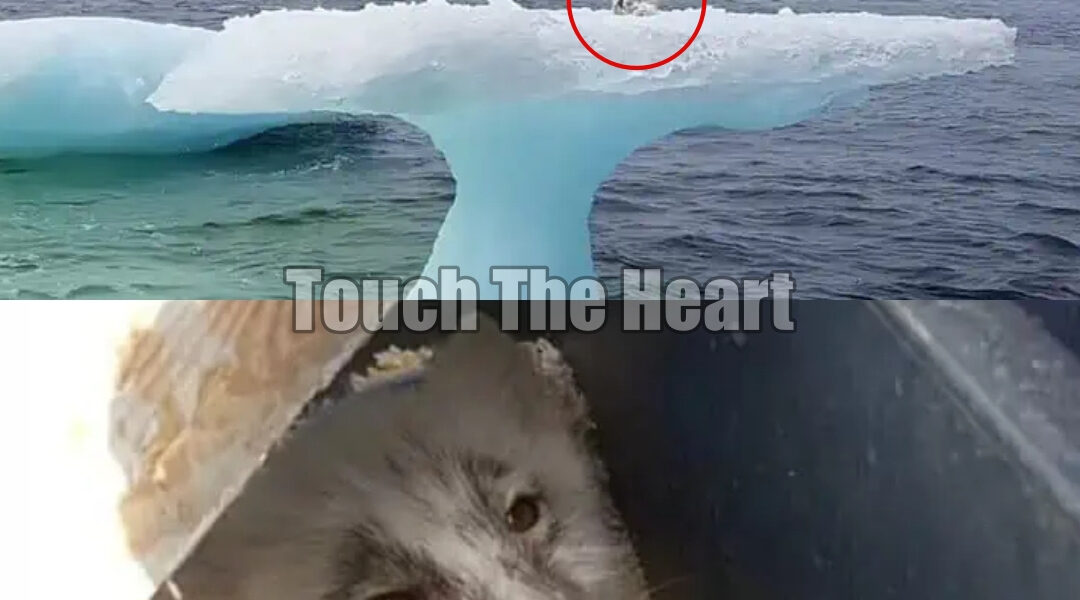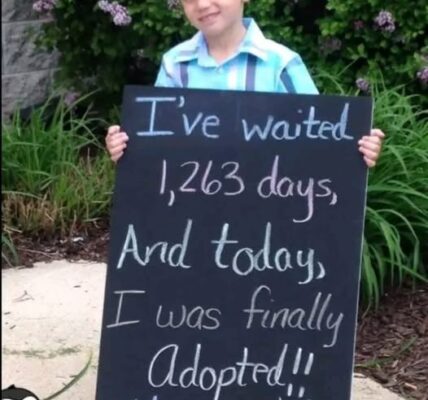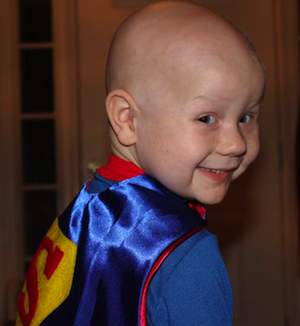The morning sky over the Labrador Sea was the color of steel — cold, silent, and endless. For crab fishermen like Mallory Harrigan and her crew, it was just another day at work — navigating through the icy waters, scanning the horizon for traps and weather shifts. But that day, something unexpected waited for them in the distance.

Far ahead, rising from the gray expanse, they spotted a strange, mushroom-shaped iceberg drifting alone. At first, it was the shape that caught their attention — smooth on top, thin at the base, like something sculpted by time and wind. But as they steered closer, something else caught Mallory’s eye.
A small figure — pale, trembling, and out of place — clung to the frozen crown.
“Seal pup,” one of the crew muttered. But as they closed in, Mallory’s breath caught. It wasn’t a seal at all.
It was an Arctic fox.
The tiny creature stood motionless, its white fur matted and soaked by the sea spray. Its eyes, wide and glassy with fear, darted toward the approaching boat. Somehow, it had become trapped — carried out to sea on a chunk of ice that had broken away from the mainland. The winds had shifted, pushing the ice farther and farther from shore, leaving the fox stranded with nowhere to go.

“He’s not going to make it out here,” Mallory whispered. The men nodded silently. They knew — in these waters, life could vanish in minutes.
The decision was instant.
Carefully, they maneuvered their fishing boat toward the iceberg, inch by inch, the ice cracking faintly as the hull nudged against it. The fox tried to move, but its paws slipped on the slick surface. It was too weak, too cold, too frightened.
When they were close enough, one of the crew reached out with a long-handled net, trying to coax it in. The fox resisted, snapping and twisting in panic. But Mallory’s voice was calm, steady, and gentle. “Easy now,” she murmured. “We’re here to help.”
After several tense moments, they managed to lift the trembling animal aboard. It was soaked to the bone, its fur clinging tightly to its small frame. For a few seconds, it just lay there, panting — exhausted, terrified, but alive.
“We knew we were his only chance,” Mallory later recalled. “The winds were changing fast. If we hadn’t gone out there, he would’ve drifted even farther into the open sea.”

The crew quickly found an old crate, lined it with towels and rags, and set it near the heater in the cabin. They offered food — bits of leftover fish and crackers — and slowly, the fox began to eat. At first, cautiously. Then hungrily.
As the hours passed, the fear in its eyes began to fade. It stopped trembling. Its breathing steadied. At one point, it even curled up in the crate and drifted into sleep, the rise and fall of its chest soft and rhythmic against the hum of the engine.
For Mallory, watching the little creature find peace felt like something sacred — a quiet reminder that compassion doesn’t always roar; sometimes, it whispers across the coldest seas.
When they finally reached shore, the crew decided to release their new friend near a sheltered area outside town. They placed him gently inside an old doghouse for warmth, left some food nearby, and stepped back.
For a moment, the fox didn’t move. Then, with a shake of his fur and a cautious glance back at his rescuers, he trotted out into the snow and disappeared among the rocks — free again.
Mallory smiled. “He shook himself off,” she said later with a laugh. “And that was that.”

Days turned into weeks, and sometimes, when their boat headed out again, the crew would spot a small white shape darting across the distant shoreline. “We still see him from time to time,” Mallory said. “He’s out there — strong and wild, just like he’s meant to be.”
The rescue itself had taken only minutes. But its meaning lingered far longer.
In that frozen expanse where survival depends on instinct and luck, a handful of humans had chosen kindness over convenience, courage over indifference. They didn’t have to stop. They didn’t have to risk getting close to a frightened wild animal on unstable ice. But they did — because in that moment, one life, no matter how small, mattered enough to save.
The Arctic fox may never understand what happened that day — how a strange wooden vessel appeared on the horizon, how warm hands lifted him from certain death. But perhaps, deep down, he carries some faint memory of it — of a world that, even for a moment, showed mercy.

And maybe that’s what Mallory and her crew will remember most too: that kindness, like light on ice, doesn’t fade. It reflects — spreading far beyond the moment itself.
Because sometimes, the greatest rescues don’t make headlines or change history. They simply change one small life — and in doing so, remind us what humanity truly means.
🐾 A small act of compassion in the coldest of places — a rescue that warmed the world.




